New Brakes Squeaking or Squealing? (Here’s Why)
When you take your vehicle in for new brakes, the last thing you expect to happen is to hear them squeaking or squealing again when you get home. But what does it mean when that’s happening? Is it normal, or did the repair shop do a bad job?
The truth is that it depends on a variety of factors. Because while you might need to take it back to the repair shop, or find a new one, sometimes it’s a perfectly normal condition.
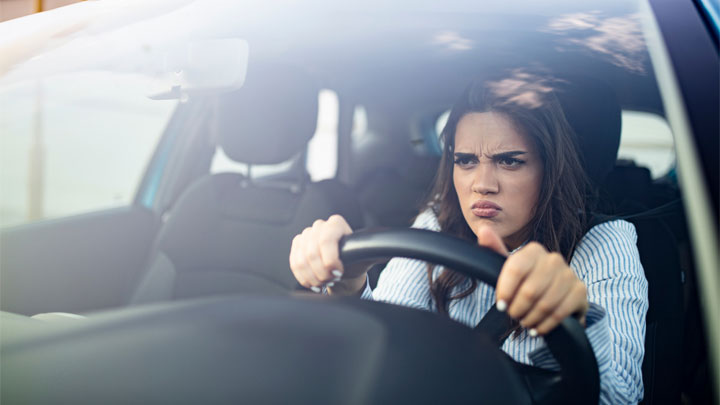
Is It Normal for New Brakes To Squeak?
While it’s perfectly normal for some brake pads to squeak, the last thing you want to do is ignore it and assume everything is fine. That’s because while it can be a normal condition, it could also be trying to tell you that something pretty serious is going on.
So, if you hear your brake pads squeaking, consider all the following potential causes, and if something doesn’t seem or feel right, take a look or take it to a mechanic to have them look at the brakes.
See Also: Why Is There a Whooshing Sound When I Press the Brake Pedal?
Main Reasons Brakes Squeak or Squeal
Before we go over the specific causes of these noises, let’s discuss how these sounds are produced.
Vibration
The vibration of brake components can cause a squeaking or squealing noise due to a phenomenon called “brake judder”. This occurs when the brake rotor or drum becomes warped or unevenly worn, causing the brake pads or shoes to vibrate and create a high-pitched noise.
The vibration can also cause the brake components to rub against each other, resulting in a squeaking sound.
Friction and Heat
Friction and heat can also contribute to brake squeaking or squealing. When the brake pads press against the rotor or drum, they create friction, which generates heat. This heat can cause the brake components to expand and contract, which can produce a high-pitched noise.
In addition, if the brake pads are made of a harder material or are not properly lubricated, they can create more friction and heat, which can lead to squeaking or squealing. This is because the increased friction can cause the brake pads to vibrate and create a high-pitched noise.
On top of that, if the brake components are dirty or contaminated with debris, this can also create friction and heat, which can lead to brake noise. For example, if brake dust accumulates on the rotor or drum, it can cause uneven wear and create a squeaking noise when the brakes are applied.
Causes of Squeaky Brakes After New Brake Pads and Rotors
There are a few potential causes of new brakes squealing or squeaking when you use them. Below we’ve highlighted the five most common and how you can tell if that’s what’s going on with your brakes.
#1 – Cheap Brake Pads
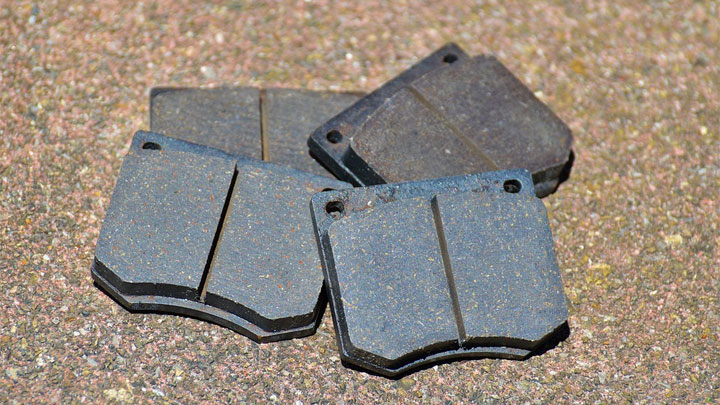
When we say “cheap” brake pads, we don’t want to give you the wrong impression. Semi-metallic brake pads do a great job of stopping your vehicle, but lower-end semi-metallic brake pads simply make noise when you hit the brakes.
If you opted for the lower-priced pads, there’s a pretty good chance that’s why you’re not getting the quiet results you want when you hit the brakes.
If you want to avoid this in the future, we recommend going with high-quality ceramic brake pads. Not only do they last longer and improve braking performance, but they’re typically quieter and don’t produce as much brake dust too.
#2 – Improperly Mated Pads
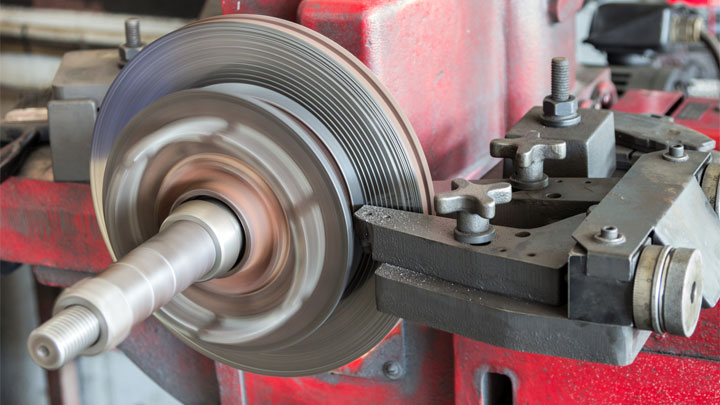
When you get the brake pads replaced, you’re supposed to either replace the rotors or surface them down. This allows the pads to mate with the rotors to get a flush fitment, giving them maximum braking power.
Not only that, but you have to break the pads in for them to work correctly.
If you neglect either of these steps, you’ll lose stopping power, and you might hear squealing or squeaking when you hit the brakes.
#3 – Moisture on the Rotor
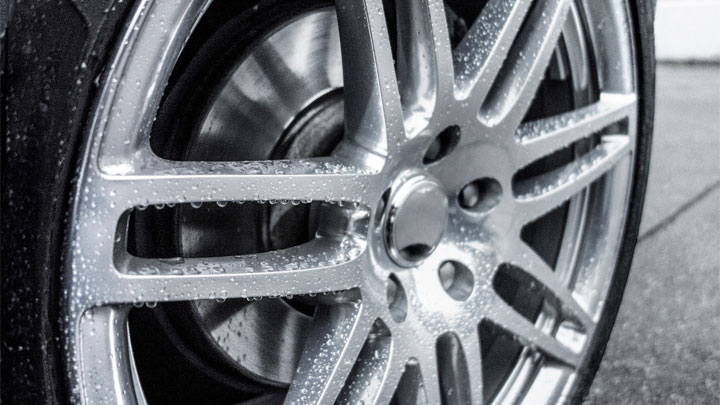
If you head out to your car and hear a squeal in the morning when you hit the brakes, there’s a good chance it’s just the pads squeaking on the morning dew. This is a normal condition, and after you hit the brakes a few times it should go away.
The same can be said after washing your car. Some moisture on the rotor can cause temporary squeaking.
#4 – Dust or Debris Between the Pad and Rotor
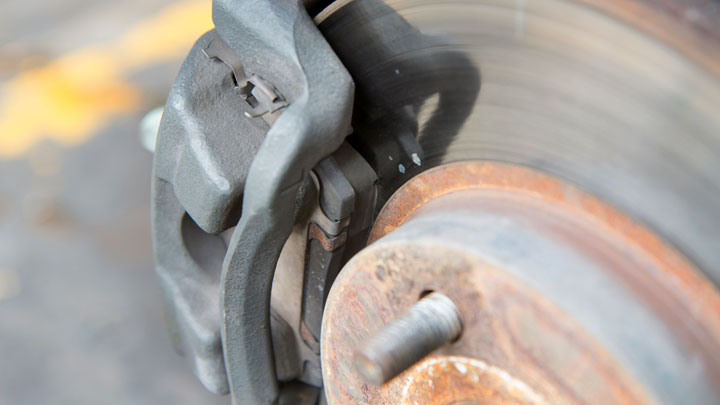
Anytime anything gets between the pad and rotor it’s going to make some noise. A little bit of dust isn’t a big deal, even if it is a bit noisy, but anything else (like a small pebble) can lead to serious problems.
Not only does debris between the pad and rotor make a loud noise, but it will also wear down the pads and rotor quickly and in an uneven manner. Even worse, it can significantly impact braking performance, leading to an accident.
#5 – Rusted Rotor
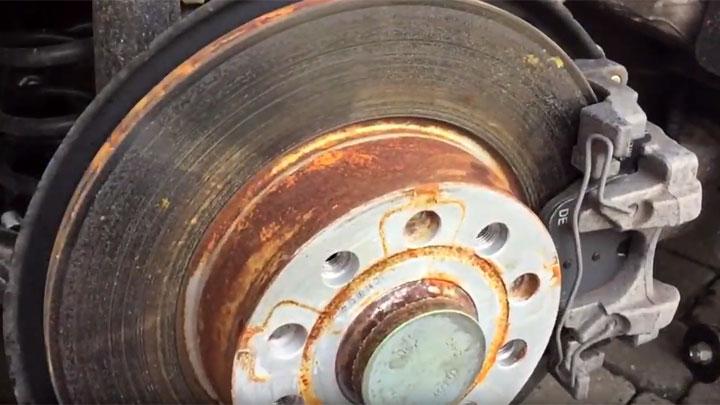
Even if you have new brake pads, that doesn’t necessarily mean you drive the vehicle a lot. If it sits for long periods, then there’s a good chance all you’re hearing is the brake pads wearing the rust off the rotor when you’re driving.
After you hit the road for 5-10 miles you should wear the rust off the rotors, and the squeaking should go away.
Will the Noise Go Away on Its Own?
It depends on what’s going on. If the problem is rusted rotors, moisture on the rotors, or even dust between the rotors and the pads, it’ll go away on its own.
However, if the problem is debris between the pad and rotor, there’s a good chance the problem will stay until someone removes the debris. Meanwhile, improperly mated pads or cheap brake pads mean that the problem won’t go away until you change out the pads and start over.
How Long Do Brakes Squeak After Being Replaced?
After replacing your brake pads, it’s quite common to hear some squeaking or squealing noises. This is because new brake pads need a break-in period to fully seat against the rotors.
During this time, you might be wondering just how long this noise will last, right? Let’s discuss that.
Typically, brake squeaking should disappear after a few days, during which you’d drive about 100 miles for your brakes to be properly bedded. However, the duration may change depending on the quality of your brake pads and rotors, as well as your driving style.
To reduce the likelihood of brake squeaks during the break-in period, you can follow these tips:
- Drive gently and avoid sudden stops
- Perform a proper bed-in procedure after installing new brake pads
- Inspect the rotors for any signs of grooves or glazing
- Regularly check and maintain your braking system
Remember, if your brakes are still squeaking after a couple of days, and it’s bothering you, it’s a good idea to get them checked by a professional. Keep in mind that brake noises after a replacement are usually not a cause for alarm, but your safety is always the priority.
When To Take Your Car Back to the Repair Shop
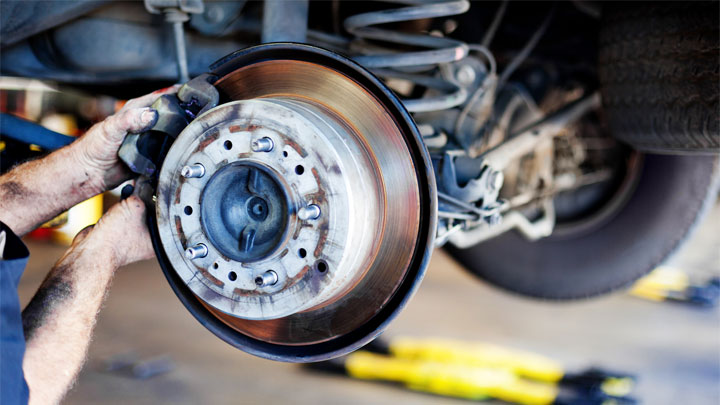
If you feel anything or hear noises beyond squeaking or squealing when you hit the brakes, you should take the vehicle to a mechanic as soon as possible. In addition, if the sound is abnormally loud, then you should take it back to the repair shop too.
While it can be a bit challenging to determine if it’s abnormally loud if you don’t know what an acceptable range is, try to use this as a rule of thumb.
With the windows up and the radio on at a low level, you shouldn’t be able to hear the squeaking or squealing. If you can, either something is going on or shoddy craftsmanship at work. Either way, the repair shop should fix it for you.
Can I Spray Something on My Brakes to Stop Them From Squeaking?
If you are experiencing squeaky brakes, using a brake cleaner spray might help solve the issue. These sprays can remove dirt and contaminants from your brake components, and they don’t leave behind any residue.
They typically dry or evaporate quickly and are safe to use on your brakes. It’s important to note, despite what you may have heard, that spraying WD40 on brakes is not a good idea.
Here are a few easy steps to apply a brake cleaner spray to your brakes:
- Ensure your car is parked on a level surface and the engine is turned off.
- Loosen the lug nuts on your wheels, then lift your car with a jack and secure it on jack stands.
- Remove the wheels to expose the brake components.
- Use a designated brake cleaner spray and follow the manufacturer’s instructions. Generally, hold the can about 10-12 inches away from the brake components and spray, making sure to cover the entire surface of the brake pads, rotors, and calipers.
- Allow the components to dry completely before reinstalling your wheels.
- Reattach the wheels, lower your car, and tighten the lug nuts.
Keep in mind that, while a brake cleaner spray may help reduce or eliminate brake squeaking, it may not be a permanent solution. If the squeaking persists, it could be a sign of another issue, such as those listed earlier in this article.
Is It Safe to Drive If Brakes Are Squeaking or Squealing?
When you hear your brakes squeaking or squealing, it’s natural to wonder if it’s safe to keep driving. In most cases, these noises are more of an annoyance than a sign of danger. However, it’s essential to understand when these sounds might indicate a potential problem with your braking system.
Brakes can squeal due to various reasons, such as:
- Morning moisture
- Surface rust on brake rotors
- New brake pad composition
- Normal wear and tear
In these situations, the squeaking is generally not a cause for concern. The noise should disappear as moisture evaporates or once the new brake pads settle in. If the sound persists, it might be a good idea to have your brakes checked just to make sure everything is working correctly.
But persistent or unusual brake noises could indicate that your brake hardware needs lubrication or that components are wearing out. If the sound becomes a constant grinding noise or if your vehicle’s performance is affected (such as wobbling or pulling to one side when braking), it’s important to have your brakes inspected and serviced right away to prevent further damage or accidents.
Other Brake Noises

While squealing and squeaking are two types of brake noises you might hear, they’re not the only ones. Below we’ve highlighted three other brake noises you might hear and gave you a quick rundown of what each one means and what you should do if you hear them.
#1 – Grinding
If you hear a grinding noise when you hit the brakes, that indicates a major problem. That’s because when you hear grinding it’s typically a metal-on-metal contact. The calipers might be hitting the brakes, or there’s something else going on.
If you have new brakes and you hear a grinding noise, take it straight back to the mechanic and have them fix it for you. You should inspect the work too, because metal-on-metal grinding can quickly lead to further damages, and they should fix those for you too.
#2 – Thumping
Thumping noises typically occur when you have warped rotors. If you didn’t choose to replace the rotors, but the repair shop surfaced them for you, that means they messed the job up.
If you choose to skip the rotors altogether, it’s probably not the repair shop’s fault and you just need new rotors.
#3 – Rattling
If you have new brake pads and you hear a rattling noise when you hit the brakes, one of three things happened.
- First, the repair shop might’ve lied to you and charged you for replacing the brakes when they really didn’t.
- Second, they might have forgotten to tighten something back up.
- Finally, you might have a broken component. This could be anything from a bolt to a caliper, but either way, it’s a pretty big deal and if it just started when you left the repair shop, they probably did it.
Either way, it’s a serious problem and you should head back to the repair shop and see what they have to say. If you suspect that there are loose components on your brakes, we highly recommend not driving the vehicle until it’s fixed.
- P0521 Code (Symptoms, Causes, How to Fix) - Mar 22, 2024
- How to PROPERLY Clean 5 Types of Steering Wheel Materials - Feb 19, 2024
- What Should You Do If Your Check Engine Light Comes On? - Nov 6, 2023
